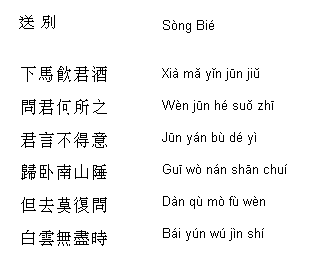Tang Dynasty Chinese Poem – Wang Wei
Farewell
Wang Wei
|
|
Dismounting, I offer my friend a cup of wine,I ask what place he is headed to.He says he has not achieved his aims,Is retiring to the southern hills.Now go, and ask me nothing more,White clouds will drift on for all time. |
Wang Wei (701761), sometimes titled the Poet Buddha, was a Tang dynasty Chinese poet, painter, musician and statesman.
From a high family, he passed the civil service entrance examination in 721 and had a successful civil service career, rising to become Chancellor in 758. During the An Lushan Rebellion he avoided actively serving the insurgents during the capital’s occupation by pretending to be deaf.
He spent ten years studying with Chán master Daoguang. After his wife’s death in 730, he did not remarry and established a monastery on part of his estate.
He is best known for his quatrains depicting quiet scenes of water and mist, with few details and little human presence. The Indiana Companion comments that he affirms the world’s beauty, while questioning its ultimate reality. It also draws a comparison between the deceptive simplicity of his works and the Chan path to enlightenment, which is built on careful preparation but is achieved without conscious effort.
A portrait of Fu Sheng, allegedly painted by Wang Wei
None of his original paintings survive, but copies of works attributed to him are also landscapes with similar qualities. He influenced what became known as the Southern school of Chinese landscape art, which was characterized by strong brushstrokes contrasted with light ink washes.

